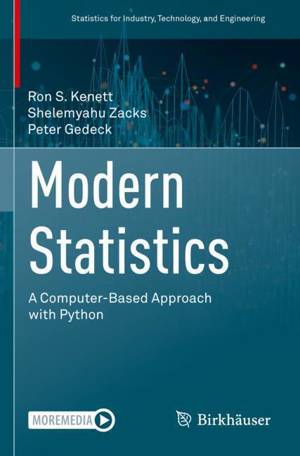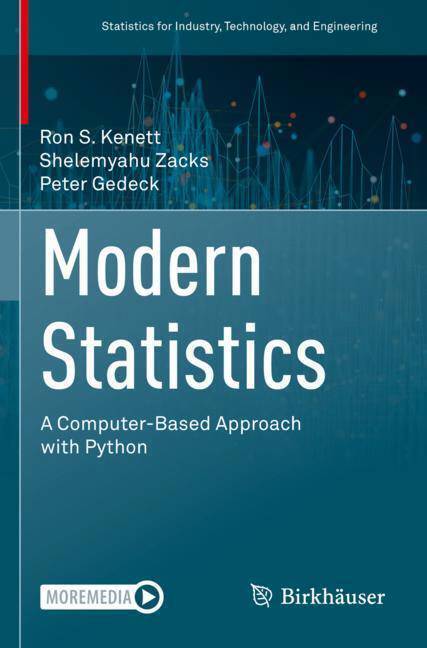
- Retrait gratuit dans votre magasin Club
- 7.000.000 titres dans notre catalogue
- Payer en toute sécurité
- Toujours un magasin près de chez vous
- Retrait gratuit dans votre magasin Club
- 7.000.0000 titres dans notre catalogue
- Payer en toute sécurité
- Toujours un magasin près de chez vous
Modern Statistics
A Computer-Based Approach with Python
Ron S Kenett, Shelemyahu Zacks, Peter Gedeck
84,45 €
+ 168 points
Format
Description
This innovative textbook presents material for a course on modern statistics that incorporates Python as a pedagogical and practical resource. Drawing on many years of teaching and conducting research in various applied and industrial settings, the authors have carefully tailored the text to provide an ideal balance of theory and practical applications. Numerous examples and case studies are incorporated throughout, and comprehensive Python applications are illustrated in detail. A custom Python package is available for download, allowing students to reproduce these examples and explore others.
The first chapters of the text focus on analyzing variability, probability models, and distribution functions. Next, the authors introduce statistical inference and bootstrapping, and variability in several dimensions and regression models. The text then goes on to cover sampling for estimation of finite population quantities and time series analysis and prediction, concluding with two chapters on modern data analytic methods. Each chapter includes exercises, data sets, and applications to supplement learning.
Modern Statistics: A Computer-Based Approach with Python is intended for a one- or two-semester advanced undergraduate or graduate course. Because of the foundational nature of the text, it can be combined with any program requiring data analysis in its curriculum, such as courses on data science, industrial statistics, physical and social sciences, and engineering. Researchers, practitioners, and data scientists will also find it to be a useful resource with the numerous applications and case studies that are included.
A second, closely related textbook is titled Industrial Statistics: A Computer-Based Approach with Python. It covers topics such as statistical process control, including multivariate methods, the design of experiments, including computerexperiments and reliability methods, including Bayesian reliability. These texts can be used independently or for consecutive courses.
The mistat Python package can be accessed at https: //gedeck.github.io/mistat-code-solutions/ModernStatistics/
"In this book on Modern Statistics, the last two chapters on modern analytic methods contain what is very popular at the moment, especially in Machine Learning, such as classifiers, clustering methods and text analytics. But I also appreciate the previous chapters since I believe that people using machine learning methods should be aware that they rely heavily on statistical ones. I very much appreciate the many worked out cases, based on the longstanding experience of the authors. They are very useful to better understand, and then apply, the methods presented in the book. The use of Python corresponds to the best programming experience nowadays. For all these reasons, I thinkthe book has also a brilliant and impactful future and I commend the authors for that."
Professor Fabrizio RuggeriResearch Director at the National Research Council, ItalyPresident of the International Society for Business and Industrial Statistics (ISBIS)Editor-in-Chief of Applied Stochastic Models in Business and Industry (ASMBI)
The first chapters of the text focus on analyzing variability, probability models, and distribution functions. Next, the authors introduce statistical inference and bootstrapping, and variability in several dimensions and regression models. The text then goes on to cover sampling for estimation of finite population quantities and time series analysis and prediction, concluding with two chapters on modern data analytic methods. Each chapter includes exercises, data sets, and applications to supplement learning.
Modern Statistics: A Computer-Based Approach with Python is intended for a one- or two-semester advanced undergraduate or graduate course. Because of the foundational nature of the text, it can be combined with any program requiring data analysis in its curriculum, such as courses on data science, industrial statistics, physical and social sciences, and engineering. Researchers, practitioners, and data scientists will also find it to be a useful resource with the numerous applications and case studies that are included.
A second, closely related textbook is titled Industrial Statistics: A Computer-Based Approach with Python. It covers topics such as statistical process control, including multivariate methods, the design of experiments, including computerexperiments and reliability methods, including Bayesian reliability. These texts can be used independently or for consecutive courses.
The mistat Python package can be accessed at https: //gedeck.github.io/mistat-code-solutions/ModernStatistics/
"In this book on Modern Statistics, the last two chapters on modern analytic methods contain what is very popular at the moment, especially in Machine Learning, such as classifiers, clustering methods and text analytics. But I also appreciate the previous chapters since I believe that people using machine learning methods should be aware that they rely heavily on statistical ones. I very much appreciate the many worked out cases, based on the longstanding experience of the authors. They are very useful to better understand, and then apply, the methods presented in the book. The use of Python corresponds to the best programming experience nowadays. For all these reasons, I thinkthe book has also a brilliant and impactful future and I commend the authors for that."
Professor Fabrizio RuggeriResearch Director at the National Research Council, ItalyPresident of the International Society for Business and Industrial Statistics (ISBIS)Editor-in-Chief of Applied Stochastic Models in Business and Industry (ASMBI)
Spécifications
Parties prenantes
- Auteur(s) :
- Editeur:
Contenu
- Nombre de pages :
- 438
- Langue:
- Anglais
- Collection :
Caractéristiques
- EAN:
- 9783031075681
- Date de parution :
- 22-09-23
- Format:
- Livre broché
- Format numérique:
- Trade paperback (VS)
- Dimensions :
- 156 mm x 234 mm
- Poids :
- 644 g

Les avis
Nous publions uniquement les avis qui respectent les conditions requises. Consultez nos conditions pour les avis.






